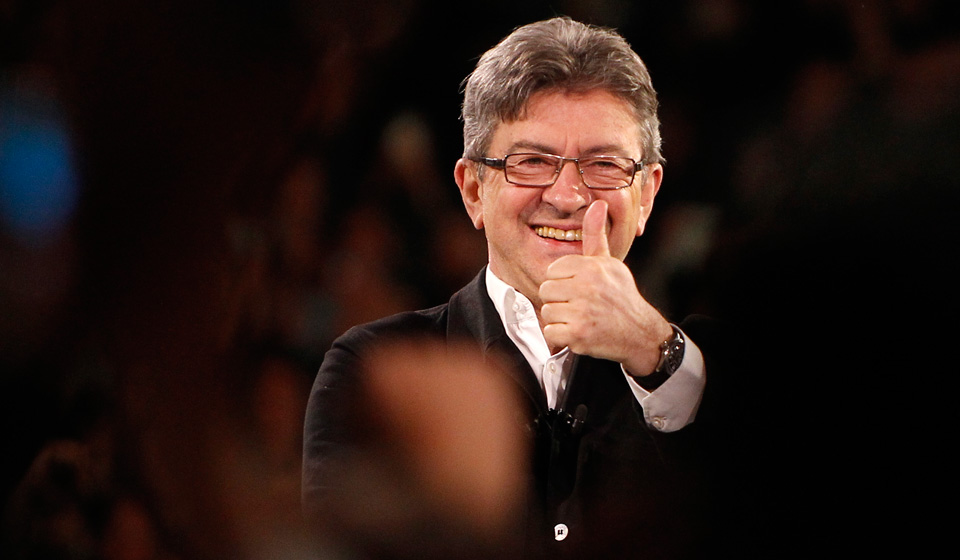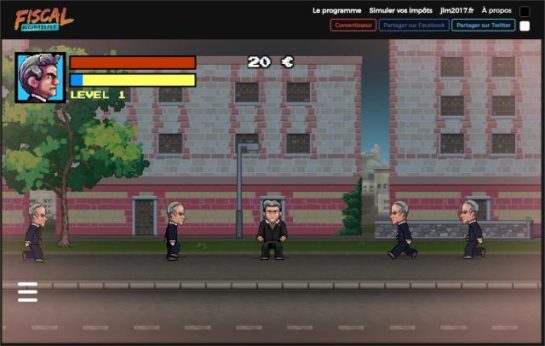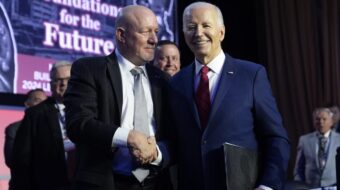
With just days to go before French voters head to the ballot box to elect their next president, the race that for weeks has been billed as a contest between anti-immigrant nationalist Marine Le Pen and centrist Emmanuel Macron has been jolted by a sudden surge from the left.
In a surprising turn of events, Jean-Luc Mélenchon, the candidate of the La France insoumise, or “France Unbowed,” alliance, is soaring in the polls. It is the latest twist in an election that is overturning the dynamics of French politics.
Backed by the French Communist Party (PCF), Mélenchon presents a stark contrast to the racist and ultra-nationalist program of Le Pen and her Front National, which has been the focus of recent election coverage. He is now within striking distance of Le Pen and the other two major candidates – Macron and conservative François Fillon.
Fiscal Kombat
With an official unemployment rate of 10 percent, negligible economic growth, increasing inequality, and a youth job market plagued by dead-end jobs and short-term contracts, Mélenchon’s radical message of left reform is catching the attention of French voters. Only a couple of months ago, he was an afterthought in a contest which was shaping up as a battle between the right and the far-right.

But on Sunday evening, an estimated 70,000 people packed into the southern city of Toulouse to hear Mélenchon’s vision of a more hopeful and egalitarian France. “We represent a France of beauty and generosity, that starts each new day mindful of our motto – liberty, equality, and fraternity,” he told those gathered. It’s a message not lost on French workers who have seen their incomes stagnate for years, even under the nominally socialist President François Hollande.
Mélenchon is also proving adept at reaching the young generation, holding simultaneous rallies in different areas of the country featuring 3D holograms of his speeches. His campaign also recently released an online anti-austerity video game known as “Fiscal Kombat.” It is modeled on the 1990s “Mortal Kombat” game series and pits players against financiers and right-wing politicians. On YouTube, meanwhile, Mélenchon’s trendy video messaging has surpassed both Donald Trump and Hillary Clinton in subscribers.
His left populist platform promises to shorten the workweek from 35 to 32 hours, cut the national retirement age to 60, expand the size of the public service, and impose tax increases on France’s wealthiest citizens – including a top marginal rate of up to 90-100 percent on incomes over €400,000. He has also expressed support for instituting a universal basic income, nationalizing the banks, and reforming France’s presidential-centered political system to be more democratic and responsive to the public.
It is a program that is winning Mélenchon the support of wide swathes of working class voters in the country, while earning him the hatred of the rich and powerful. The right-wing newspaper Le Figaro calls him an “apostle of revolutionary dictators,” and lumps him in with Fidel Castro and Hugo Chávez.
Conservative candidate Fillon also redbaits Mélenchon over his PCF backing, a tactic which has only resulted in Mélenchon further embracing his role as a standard-bearer for the broad left. “Mr. Fillon reproaches me for being a communist,” he said at the Toulouse rally on Sunday, “It’s a reproach I find totally tolerable.”
Olivier Dartigolles, a spokesperson for the PCF, said that the bitterness of the attacks on Mélenchon’s socialist politics were proof that his message was winning through. “Throughout political and social history, at each advance at the ballot box or in the streets, the discourse of fear of the ‘red’ has always been used by those who supported the system and opposed democratic conquests,” he told l’Humanité. Dartigolles said it was a sign that “the class struggle is not behind us,” and that “the wind is beginning to blow in the right direction.”
Left populism and the EU question
Mélenchon’s pledge to withdraw France from the U.S.-dominated NATO military alliance, the World Bank, and the International Monetary Fund – as well as his vow to renegotiate France’s relationship with the European Union (EU) and its neoliberal economic policies – has drawn some comparisons to the ultra-nationalist and isolationist program of Le Pen. The tabloid and corporate press regularly brand them both as simply “anti-EU candidates.”
The programs of the two populists – one left and the other right – are worlds apart, however.
Despite surface level comparisons that focus simply on their criticisms of the EU, the motivations driving their supporters differ substantially. Mélenchon calls for a pragmatic reworking of France-EU relations in order to reverse the impact of the latter’s neoliberal economic policies, inequality, and undemocratic functioning.
He says that eventual withdrawal from the EU may prove necessary, but that a social reorganization of the trade bloc is preferable. He wants the French state to have greater authority in determining the country’s economic and social policies outside the bounds of EU-imposed austerity.
Le Pen, by contrast, demands France’s immediate exit from the EU, relying on national supremacy and anti-foreigner rhetoric to support her position. It is a playbook being used by right-wing would-be authoritarians around the globe.
Hoping to repeat the success Trump found with his anti-immigrant messaging, Le Pen calls for a “return to the time of borders” and promises French workers that she will protect their jobs and keep immigrants – especially Muslim ones – out. A similar message carried her father, Jean-Marie Le Pen, to the second round of the presidential elections in 2002.
A left-right choice?
Latest opinion polls show a four-way race with Macron and Le Pen in the lead, Mélenchon a close third, and Fillon in fourth place. Only a few points separate the four, meaning that any two of them could move ahead to the final round run-off of France’s two-stage election system.
Earlier in the year, it appeared that the last vote was likely to be a match-up of Fillon and Le Pen, presenting voters a choice between a right-wing candidate or a far-right one. But a scandal involving improper payments of public funds to members of Fillon’s family has undercut his support.
Macron, the current front-runner, was formerly a minister in President Hollande’s Socialist Party government, but left last year to run as an independent. He has sought to position himself a centrist candidate with politics that supposedly go beyond the left-right divide. As Le Pen catapulted into first place in many polls this spring, Macron benefited from Fillon’s dive and was increasingly seen as the only candidate capable of stopping the Front National.
The Socialist Party’s nominee, Benoît Hamon, meanwhile, failed to gain traction and fell to fifth place. Fillon’s scandal and the Socialists’ electoral collapse thus appeared to cement Macron’s position as the sole viable Le Pen alternative.
But Le Pen is now facing a financial scandal of her own involving misuse of EU parliamentary funds. Macron’s ‘austerity-lite’ program of 120,000 public sector job cuts (compared to Fillon’s 500,000) and his promised €60 billion slash in spending are failing to inspire, creating an opening for a genuine left alternative to the racist far-right.
It is an opportunity that Mélenchon and his supporters are taking advantage of, hoping that he is hitting his stride at the perfect moment in this long campaign. Macron still leads and many predict it will be him who faces Le Pen in the second round. But should Mélenchon survive to face the far-right Le Pen, French voters will be presented with a choice akin to Rosa Luxemburg’s famous option of “socialism or barbarism.”
While Le Pen attempts to don the authoritarian guise of national savior, Mélenchon calls on the French people to decide their own future.
“It’s the people who make history,” he recently said on stage before a crowd of thousands. “It’s you! So we have to do it. Let’s go!”

MOST POPULAR TODAY

‘Warning! This product supports genocide’: Michigan group aims to educate consumers

Ohio: Franklin County treasurer attends Netanyahu meeting, steps up Israel Bond purchases

“Trail of Tears Walk” commemorates Native Americans’ forced removal

After months of denial, U.S. admits to running Ukraine biolabs

Hold the communism, please: SFMOMA’s Diego Rivera exhibit downplays artist’s radical politics






Comments